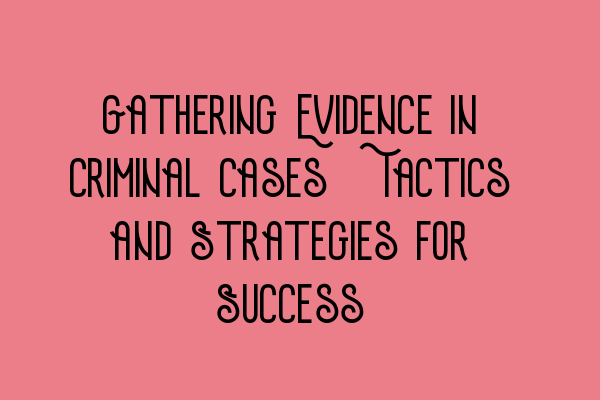Gathering Evidence in Criminal Cases: Tactics and Strategies for Success
Welcome to the SQE Criminal Law & Practice Law UK blog, where we provide expert advice and insights on various legal matters. In this article, we will explore the crucial topic of gathering evidence in criminal cases and discuss the tactics and strategies for achieving success.
The Importance of Evidence
In any criminal case, evidence plays a fundamental role in determining the outcome. Gathering strong and admissible evidence is essential to build a compelling case and convince the court of the defendant’s guilt or innocence. Without solid evidence, it becomes challenging to prove the allegations beyond a reasonable doubt.
Now, let’s delve into the tactics and strategies that can significantly enhance the effectiveness of evidence gathering in criminal cases.
1. Conduct a Thorough Investigation
The first step in gathering evidence is conducting a meticulous investigation. This includes interviewing witnesses, collecting physical evidence, reviewing documents, and examining digital records. By leaving no stone unturned, you increase the chances of discovering critical evidence that can strengthen your case.
To learn more about conducting thorough investigations, check out our article on Legal Challenges for UK Businesses in the U.S.: Strategies for Overcoming Hurdles.
2. Preserve Chain of Custody
When gathering evidence, it is vital to maintain a strong chain of custody. This means ensuring that the evidence is properly handled, documented, and stored to establish its authenticity and integrity. Any gaps in the chain of custody can raise doubts about the evidence’s reliability and potentially lead to its inadmissibility in court.
For detailed insights into preserving the chain of custody, refer to our article on Ensuring Ethical Business Practices: Delaware’s Code of Conduct.
3. Utilize Digital Forensics
In today’s digital age, digital forensics has become an invaluable tool in gathering evidence. By analyzing digital devices, online communications, and electronic records, investigators can uncover crucial evidence that traditional methods might miss. Digital forensics has proved instrumental in solving complex criminal cases and presenting compelling evidence in court.
To know more about the role of digital forensics in evidence gathering, read our article on Legal Representation for Delaware LLCs in the UK: Expert Advice.
4. Collaborate with Experts
Collaboration with experts in various fields can greatly enhance the strength of your evidence. Forensic experts, DNA analysts, psychiatrists, and other professionals can provide expert opinions, interpretations, and analyses that can significantly sway the court’s decision in your favor. Their specialized knowledge and experience can be instrumental in building a strong case.
For aspiring solicitors seeking preparatory materials for the SQE exam, check out our recommended resources in our article on SQE Exam Prep: Essential Study Materials for Aspiring Solicitors.
5. Ensure Legal Compliance
Lastly, it is crucial to ensure that all evidence gathering activities comply with legal and ethical standards. Follow proper procedures, adhere to confidentiality requirements, and obtain necessary permissions and warrants when required. Failure to comply can not only compromise the admissibility of evidence but also lead to legal consequences and tarnish your professional reputation.
By implementing these tactics and strategies, you can significantly improve your ability to gather strong and convincing evidence in criminal cases. Remember, thoroughness, attention to detail, and collaboration are key to achieving success.
For more expert advice and insights, stay tuned to the SQE Criminal Law & Practice Law UK blog.
